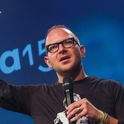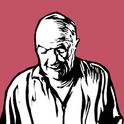Jonathan Coe opts to meet at the Troubadour café in Earls Court, West London. The creep, creep, creep of chain coffeeshops is a matter of deep regret to him, and this café, with its basement music venue is, he explains “the last man standing”. The Troubadour was where a barely known American folk singer called Bob Dylan performed in 1962, the year after Coe was born. His latest novel, The Proof of My Innocence, asks how a fixation on profit has elbowed the Britain he once knew out the way—making the survival of the Troubadour a fitting backdrop for our conversation.
The new novel is a characteristic Coe gambit. Stories within stories gradually reveal panels of a bigger picture. Like his landmark 1994 What a Carve Up!, the novel is pegged around a murder, and again in a country house. But this time it is a country house hosting a conference by a murky right-wing thinktank called TrueCon (geddit?). It’s September 2022 and one speaker, Kwasi Kwarteng, has cancelled his keynote because Liz Truss, the new prime minister, has appointed him chancellor of the Exchequer. A blogger attending the conference, who holds damning information on TrueCon, is murdered in his room—and news reaches the conference of another death, that of Queen Elizabeth II.
“This was meant to be a British-centred book about how the Conservative movement has been radicalised over the last 40 years,” Coe reflects, “but I realised how entangled this was with American conservativism. When Truss talks about the ‘deep state’, that’s a very conservative thing to say, and, of course, it’s pure Trump. The book, really, is about the stories people tell themselves to come to terms with experiences—and Truss telling herself stories, attempting to come to terms with her time as PM, felt part of that.”
Although words from her speeches litter the text, Truss and Kwarteng never appear in person. Other real people—Roger Scruton and Roy Jenkins, who fears his trousers are about to be ripped off him in a student jape during a flashback to 1980s Cambridge—do appear. What function do such cameos fulfil? “If I put real characters into a book, I can say that the made-up characters are entirely made up. The fact Scruton is mentioned means that a character people might think is based on Scruton cannot be him.”
That smoking-gun evidence threatening TrueCon is traced back to the Cambridge of the 1980s, where Coe himself studied. “I’d been meaning for years to write about my time at Cambridge. When I was there, between 1980 and 1983, it was said that some dons had the ear of Mrs Thatcher. Coming from suburban Birmingham, which had no connection with politics or the media, that seemed astonishing. I’d been catapulted into a world where the Venn diagram overlapped.”
One apparently minor detail fascinates me. Why did Coe have one of his characters discuss Morecambe and Wise? “Two Christmases ago the television schedules were rammed with repackaged Morecambe and Wise, which seemed to be about nostalgia for something that could never be repeated. I dug out my MA thesis, about Samuel Beckett and the double-act, and the idea that a double-act is a two-person microcosm of society. Then I realised that, in 1985, Ernie Wise made the first official mobile phone call in Britain, just a few months after Eric Morecambe died—and to me the phone symbolised the idea that a more individualistic society was on its way.”
So Morecambe and Wise are used to bridge the comedy of his novel with its politics? “That’s happening anyway! We’ve had our comedian PM and Trump is pure standup too. He’s losing his comic timing and his cognitive abilities—but his rallies always channelled Rupert Pupkin, don’t you think?”













